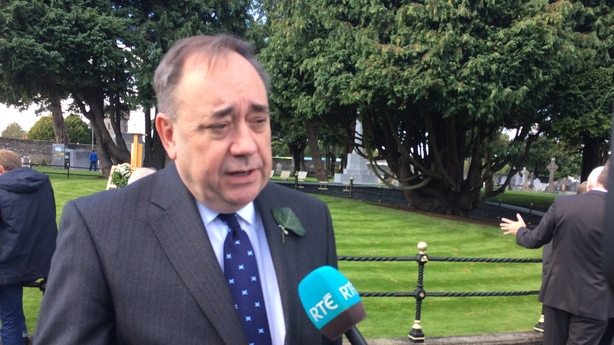British Prime Minister Theresa May has made clear she will not accept any limits on Britain's ability to control immigration in negotiations to leave the European Union which will start by the end of March 2017.
In a speech to the Conservative Party conference in Birmingham, Ms May confirmed she will kick-start the two-year process of withdrawal talks by invoking Article 50 of the EU treaties within six months.
The announcement paves the way for Brexit to take place by the summer of 2019 - a year ahead of the scheduled date of the next general election.
Taking the unusual step for a Tory leader of addressing the conference on its opening day, Ms May rejected the argument Britain must choose between "hard Brexit" - in which it regains control over immigration but loses access to the European single market - and "soft Brexit", under which access to the single market comes with a requirement to allow free movement of EU workers.
"Whether people like it or not, the country voted to leave the EU," said Ms May.
"That means we are going to leave the EU. We are going to be a fully independent, sovereign country, a country that is no longer part of a political union with supranational institutions that can override national parliaments and courts.
"That means we are going, once more, to have the freedom to make our own decisions on a whole host of different matters, from how we label our food to the way in which we choose to control immigration."
To loud applause, she added: "I know some people ask about the 'trade-off' between controlling immigration and trading with Europe. But that is the wrong way of looking at things.
"We have voted to leave the European Union and become a fully independent, sovereign country.
"We will do what independent, sovereign countries do. We will decide for ourselves how we control immigration. And we will be free to pass our own laws."
We need your consent to load this rte-player contentWe use rte-player to manage extra content that can set cookies on your device and collect data about your activity. Please review their details and accept them to load the content.Manage Preferences
She said her aim would be to strike a deal with the UK's EU partners to include "co-operation on law enforcement and counter-terrorism work ... (and) free trade in goods and services", and to give British companies "the maximum freedom to trade with and operate in the single market and let European businesses do the same here".
Ms May added: "Let me be clear: We are not leaving the European Union only to give up control of immigration again. And we are not leaving only to return to the jurisdiction of the European Court of Justice."
European Council President Donald Tusk welcomed the "clarity" presented by Mrs May's timetable, which he said would allow the remaining 27 EU states to "engage to safeguard (their) interests".
Minister for Foreign Affairs Charlie Flanagan welcomed the announcement that Britain will trigger Article 50 by next March.
He said it was important to have a date, and suggested the timeline was as he had expected.
Mr Flanagan said Ireland had been preparing for Brexit for the past year, but would now intensify those preparations across various government departments.
He said the country would meet "head on" the challenges posed by Britain's exit from the EU.
Mr Flanagan said that Ireland hoped the UK would ultimately achieve a deal that was "as close as possible to its current arrangements".
However, Sinn Féin president Gerry Adams said the Government is not adequately prepared for negotiations on Brexit.
"The result of the Brexit referendum has been known now for over three months, yet we've yet to see any meaningful propositions coming from the Taoiseach and his Ministers in the intervening period on the key issues and potentially significant consequences for the island, north and south," he said.
'Great Repeal Bill' to enshrine EU legislation
Earlier, Ms May announced a "Great Repeal Bill" would be put in place to end the authority of EU law once Britain leaves the union.
The legislation will overturn laws that make EU regulations supreme, enshrine all EU rules in domestic law and confirm the British parliament can amend them as it wants.
"This marks the first stage in the UK becoming a sovereign and independent country once again," Ms May told The Sunday Times newspaper.
"It will return power and authority to the elected institutions of our country. It means that the authority of EU law in Britain will end."
Chris Grayling, Britain's transport minister, indicated this act will go through parliament between March of next year and May 2018.

Government lacks 'coherent policy' - Salmond
The former Scottish First Minister, Alex Salmond, has accused the UK government of lacking a "coherent policy" on Brexit.
Speaking at a commemoration event in Dublin, the SNP MP said Ms May was now "steering towards the rocks" and a "hard Brexit".
He said Ms May "would not bend on freedom of movement" which would result, he said, in other EU states not bending on membership of the single market.
Mr Salmond said he believed the Scottish First Minister, Nicola Sturgeon, would make a "more positive proposal to discharge her mandate to preserve Scotland's connection with Europe".
He said that if Westminster refuses to make concessions to Scotland, Ms Sturgeon will call a second referendum on independence.
Mr Salmond said this would be held by the autumn of 2018, and he said he was certain it would pass.

